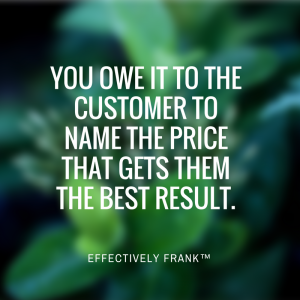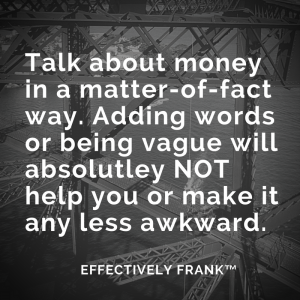When you get to the point of talking money, it means you have successfully navigated most of the way through a process. Perhaps your interview was a hit, and you’ve been offered the job. Or maybe the new client saw your website and wants to work with you. It’s the moment where you get to discuss the details and the dollars.
Feel a little nervous just thinking about what your work is worth? Do you struggle to state your price?
You are not alone. This topic is fraught with anxiety for even the most competent among us.
Here are 5 tips to be Effectively Frank™ about money, so you can set the fear aside and get focused on getting paid what you deserve.
Flip It
The first thing that needs to happen is to set aside your discomfort and anxiety. If your anxiety is high, work on that first. You can’t let fear talk money on your behalf.
One way to do this is to flip the script in your internal dialogue. Instead of worrying, “What am I worth?” or “What if they don’t think it’s worth it?” Flip it around. Identify the amount of money you need to make to fully show up with all your time, effort, skills, and attention. Ask yourself, “How much do I need to be paid to make this worth it for me?”
Asking for the “worth it” price means you will do your best work and not be kicking yourself for not asking for more. It’s the price that allows you to fully commit to the project, service, or product you need to deliver. You owe it to the customer to name the price that gets them the best result.

Know the Why
Understand why you are asking for the amount you are stating. This will help alleviate anxiety, because you are asking for a number with meaning.
In my work, I charge my rate per session because I know that’s what makes it worth it for me to spend one hour giving someone my complete focus and expertise. It’s the number I need to make per year to reach my financial goals divided by the time I can see clients and maintain high quality work. It’s then compared to market rates. It has to be re-evaluated annually. If people question me, I’m clear. It is not abitrary, there are good reasons behind the number.
When you know exactly why you are asking for a specific amount of money, and that it is in line with the market, you can be confident that your proposal makes sense.
State it Clearly
Talk about money in a matter-of-fact way. Adding words or being vague will absolutley NOT help you or make it any less awkward. Show that you have a thoughtful price by saying it with authority. “For this position, I require a salary of $75,000.” “My workshop is $95.” “The product cost $695.”
State the facts. Don’t use any extra words. DO NOT APOLOGIZE.
Be slow and hesitant to back away from your price. Only do so when it makes complete sense and you feel it’s absolutely worth it. If you take less money, then you need to gain some clear, desireable benefit, like a highly valuable opportunity or unique learning experience.

Get Curious
If the person you are negotiating with does not agree with the rate/salary/asking price, slow down. Take a breath. Don’t shut down or get defensive. Get curious.
What do they think it should be? How did they arrive at that conclusion? What data do they have to support it? Say, “Help me understand how you arrived at that figure.” If their logic is faulty, you’ll hear it. Ask them to explain anything that does not make sense. It gives you an opportunity to show the places where you are adding value that they did not realize or understand.
Being curious gives you a chance to see the other person’s thought process, and have a clarifying conversation. Maybe you misunderstood and have quoted more because you thought the project was more complex. Perhaps they didn’t realize the time or special expertise that you are bringing to the work.
Talking about money can provide an opportunity for clarification that may be helpful as you continue to work with the other party. Stop thinking of it as a confrontation or conflict. Instead, think of it as a means of creating a clear working relationship.
Check Your Gut
If the other party doesn’t want to pay you your rate, they may not value you and your contribution. You need to ask yourself, “Will I be valued in this relationship? Is this worth it for me to do or should I move on? If I set fear aside, what do I really think is in my best interest?” Watch for the, “No one else will have me” trap. It’s bad in personal and business relationships!
 Getting paid what your work is worth means walking away when needed. In other words, you need to know how to say “no.” If you have not yet mastered this two-letter word, you are losing valuable time and money. You can’t afford to miss the upcoming workshop The Positive Power of “NO.” Tickets for this in-person workshop are on sale now on Eventbrite. Leave confident in yourself and your ability to say “no,” all while gaining respect and trust from others.
Getting paid what your work is worth means walking away when needed. In other words, you need to know how to say “no.” If you have not yet mastered this two-letter word, you are losing valuable time and money. You can’t afford to miss the upcoming workshop The Positive Power of “NO.” Tickets for this in-person workshop are on sale now on Eventbrite. Leave confident in yourself and your ability to say “no,” all while gaining respect and trust from others.
 Hannah Curtis is the founder of Effectively Frank™, a program that teaches the art of clearly and simply speaking your truth. Hannah believes we are all better people when we speak from a place of honesty and clarity. She runs a therapy private practice, New Approaches, in Portland, Maine. She is currently expanding her communication coaching offerings, contact her for more details: [email protected].
Hannah Curtis is the founder of Effectively Frank™, a program that teaches the art of clearly and simply speaking your truth. Hannah believes we are all better people when we speak from a place of honesty and clarity. She runs a therapy private practice, New Approaches, in Portland, Maine. She is currently expanding her communication coaching offerings, contact her for more details: [email protected].


0 Comments